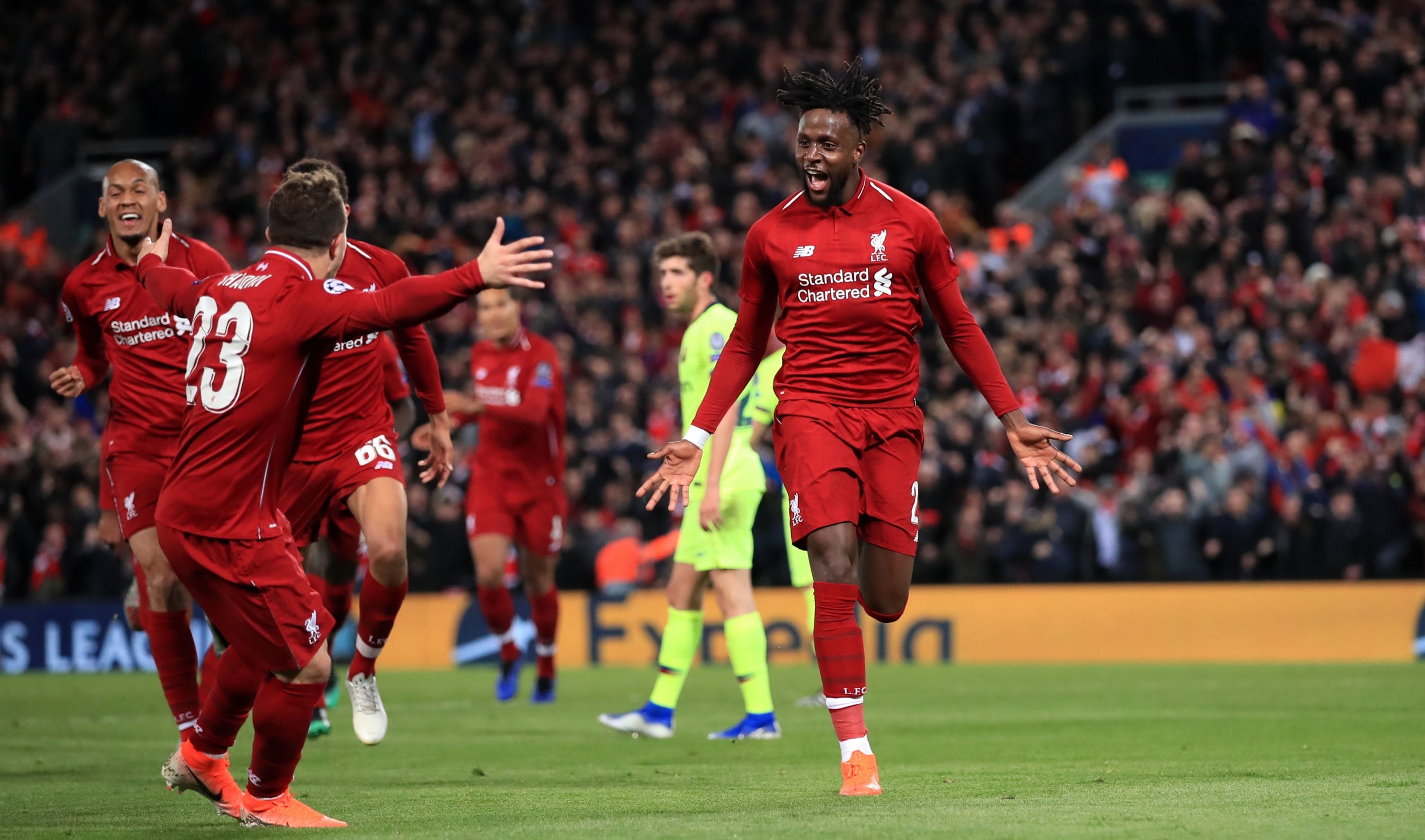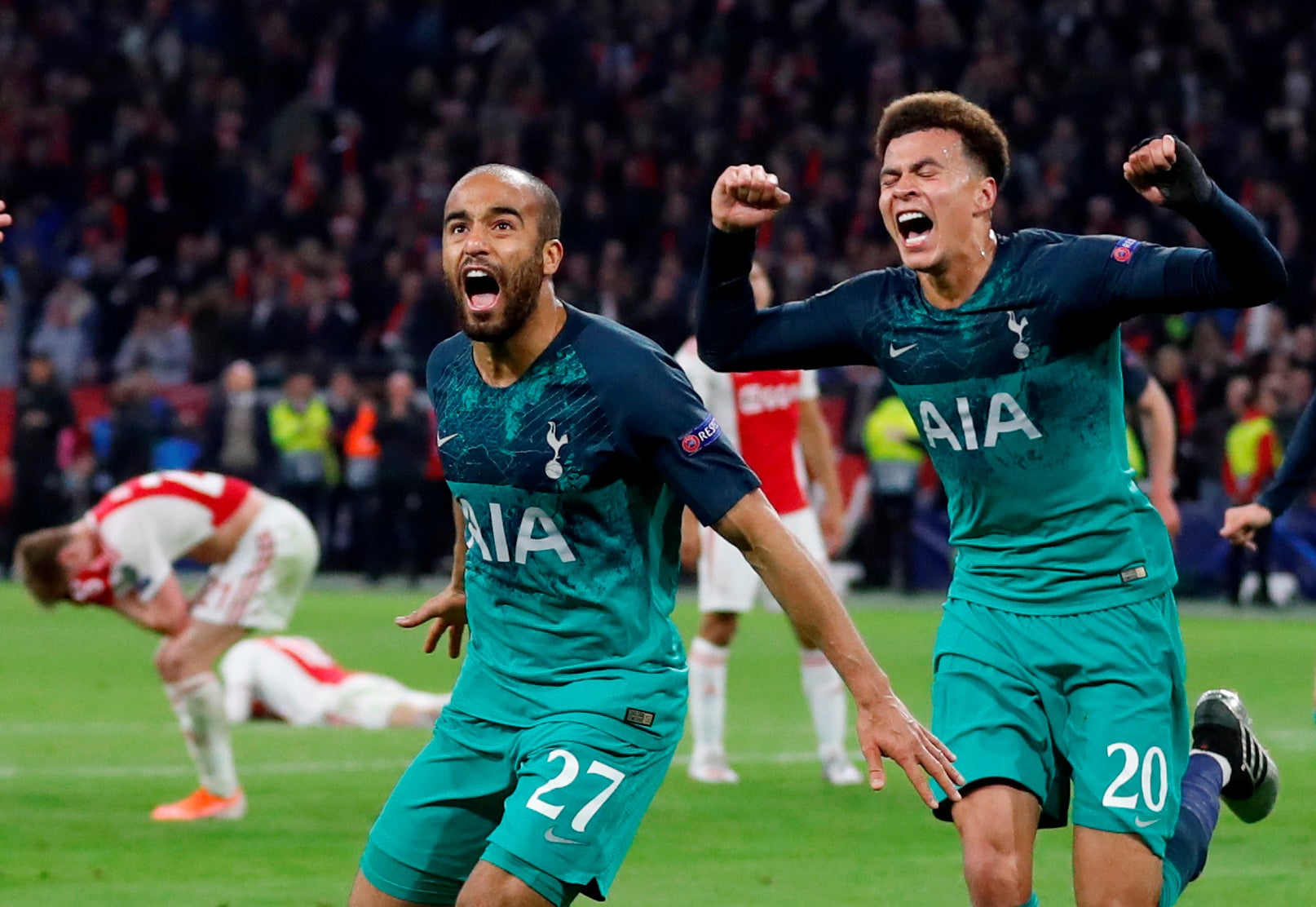Liverpool, Tottenham and why the Champions League remains the greatest show in sport
This year has seen more drama then ever in a competition that continues to set the standard for pure quality and even purer entertainment

Your support helps us to tell the story
From reproductive rights to climate change to Big Tech, The Independent is on the ground when the story is developing. Whether it's investigating the financials of Elon Musk's pro-Trump PAC or producing our latest documentary, 'The A Word', which shines a light on the American women fighting for reproductive rights, we know how important it is to parse out the facts from the messaging.
At such a critical moment in US history, we need reporters on the ground. Your donation allows us to keep sending journalists to speak to both sides of the story.
The Independent is trusted by Americans across the entire political spectrum. And unlike many other quality news outlets, we choose not to lock Americans out of our reporting and analysis with paywalls. We believe quality journalism should be available to everyone, paid for by those who can afford it.
Your support makes all the difference.It was not just a moment that every other supporter would envy, but also every film director, every prime-time TV director. Really.
As Lucas Moura suddenly turned the ball towards the corner of Andre Onana’s goal, the 50,000-plus Ajax supporters that had in one second been so excitedly anticipating their greatest moment in decades suddenly fell completely silent.
The stadium just went quiet, offering a drop in noise that was the height of drama. That silence was all the more potent because of its immense sporting significance.
In the Johan Cruyff Arena, it had a visceral power.
On television, it had a genuinely cinematic quality. This is why any director would envy that emotional impact, and from one single scene. Cineastes can cite any number of great moments in film to compare.
And that’s even before you take in the contrasting sights of Tottenham Hotspur players celebrating like never before, as young Ajax players lay flat on the turf suffering like never before; before you take in the narrative twists; the high technical quality; the utterly arresting nature of the drama… and then all of what happened the night before at Anfield, or in previous rounds given it’s now almost week to week.
To paraphrase Nick Hornby in Fever Pitch, real life doesn’t have last-minute winners… or epic comebacks from 3-0 down. Film scripts meanwhile never really authentically replicate the true emotion of such sport moments, which is why fiction that tries to capture on-pitch action is usually underwhelming.
You can’t compare to the real thing. Nothing can compare to this.
This was the Champions League as the highest entertainment, to supersede a show like Game of Thrones or rival pretty much any film you can think of.
And it’s all because the Champions League knock-out stages are now the highest level of sport in terms of pure quality, without any viable rival you can think of. It is the pinnacle.
That is no exaggerated or ill-thought claim.
It stands up to any scrutiny. Consider the parameters.
Football is already the sole sport with truly universal appeal, both in terms of support and participation. It goes to all corners in the way nothing else can. That means it has by far the biggest potential pool of players, and the wonder about whether someone great in another sport would be great in football is infinitesimally lower. The Olympics may compare in terms of total mass appeal, but that’s only because of its very fragmentation, that dilutes participation. Whereas almost anyone can be a footballer, very few can be a 100m sprinter, or a 5000m runner. Golf meanwhile requires a base price of equipment that precludes vast swathes of the globe, while cricket only has true mass appeal in the countries that used to form the British empire.

The real key to this, however, is what the Champions League is as a competition to bring all of this together.
There isn’t another event that offers such an intense concentration of the highest quality, from the highest possible pool. As the competition that all of central Europe’s super-clubs strive for, it attracts all the interest, all the wealth, and thereby all of the talent - and that’s talent in terms of player, coach and ideas.
The World Cup - which is maybe the pinnacle of sport in terms of emotional investment - simply can’t get close to it in that regard, since it is now generally mid-level coaches, presiding over groups of disparate talent, who have nowhere near the preparation or integration time the clubs do.
Playing into all of this is how those top clubs now see entertainment as a vital part of their identity, especially given how they promote themselves around the planet. That was first caused by the evolution in coaching and changes in the game that first fostered a resurgence of pronounced attacking football - and that Jurgen Klopp and Mauricio Pochettino have been such proponents of - but also ensured it is all propelled, in a cycle as intense as some of the pressing that so electrifies the Champions League.

This all adds up to why it is now the greatest show on earth.
This doesn’t necessarily have the greatest consequences for the sport, or the greatest causes.
This intense concentration on the Champions League in terms of supporter, media and financial interest is playing its part in eroding the rest of the game.
It tramples everything else in its wake, bar perhaps the Premier League.
The Champions League knock-outs are not just the greatest show on earth, but also the greatest show of the effects of pure capitalism, and how it can seduce us.
That is what these major clubs represent, especially the group of super-clubs.
And yet it’s impossible to turn away.
That at once means it is guilty pleasure, and high-end entertainment.
There is also, counter-intuitively, something of an encouraging contradiction built in.
If the obvious temptation from the senior super-club figures is to take this further, and finally push a European super league, the encouragingly clear reality is that it just wouldn’t be able to compare.
A key element in what makes the Champions League so great, so dramatic, is the knock-out structure that means sudden death for clubs who have invested so much - and not just as regards money. It is all the big stars going up against each other, with a real sense of peril.
Most of a league campaign would be so sterile in comparison. The Cricket World Cup has already found out this to its cost, with how they have foregone knock-out games with a bloated group stage almost designed to be devoid of suspense.
The Champions League’s own group stage is another example. Except, with the way the competition has gone, you could almost argue from a dramatic perspective that this is a necessarily slow build-up that only adds to the ultimate pay-off - while also offering the seed for even greater surprises later on.
Now, at the other end, we have the grand finale. Everything is set up between Liverpool and Tottenham Hotspur for something just as sensational, with another dramatic element only added with how well the two teams know each other.
It’s of course entirely possible this one-off won’t be able to live up to what has come before it. That happens with a lot of finals, particularly in the Champions League. The competition is in fact often at its most effervescent at the semi-final stage. That happens with a lot of great TV drama, where the penultimate episode is often the one with all the explosion and bombast, before the more subtle tension of the finale.
That would just further reflect how this is great entertainment, and would still be great drama.
It remains the greatest show, the pinnacle of sport.
Join our commenting forum
Join thought-provoking conversations, follow other Independent readers and see their replies
Comments